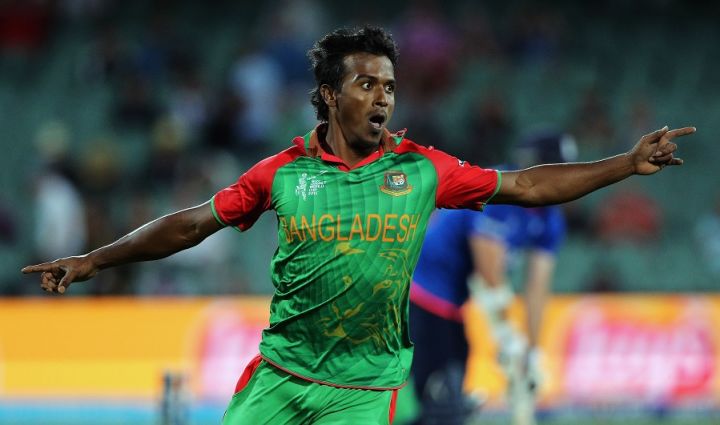Bangladesh's psychological edge with 7-0 record
In what most are calling a game of no consequences, Bangladesh would not like to let go of their recently-acquired momentum and the record they have against New Zealand

New Zealand and Bangladesh have progressed in opposite directions since their last meeting in November 2013 but, ahead of their World Cup encounter in Hamilton on Friday, their recent history will give at least one team some takeaway. Bangladesh boast of a 7-0 record from their last two series and, though that statistic is undermined by New Zealand's current form that has made them among the favourites for the World Cup, there is no denying the confidence Bangladesh derive from it and the role that winning sequence played in their subsequent performances.
The topic did come up on the eve of what will be the last league match for both sides. New Zealand captain McCullum ruled out any revenge plots and said that they are treating Bangladesh as just another opponent ahead of bigger games in the tournament.
"It's not about payback time," McCullum said, "We are in the middle of a very important tournament and Bangladesh is our next challenge. We have been playing some good cricket and we have got some big tests coming up and tomorrow is no different. In our own conditions I'm confident we'll put up a good showing and I'm sure Bangladesh are confident as well."
Bangladesh coach Chandika Hathurusingha had even less time to dwell on 7-0, saying New Zealand's current form means Bangladesh have no psychological advantages as such. "It would have been a psychological advantage if we played back home. But here, they are the form team and we have to play our best cricket," he said.
Bangladesh won both those series on the usual slow and low pitches in Mirpur and one slightly quicker surface in Fatullah. Though the Seddon Park pitch doesn't have a reputation for spin, the manner in which R Ashwin and Suresh Raina bowled against Ireland should encourage Bangladesh in this game. Plus, New Zealand's middle order is yet to bat for a period long enough to deem challenging for them and the opposition bowling attack.
Nonetheless, those victories have injected some strengths into the Bangladesh team's make-up that was previously unknown. Shakib Al Hasan's rise as a bowler came against these same opponents in 2008, but it was during the 2010 ODI series that he added consistency to his all-round abilities. Shakib had done well in a tri-series involving Sri Lanka and Zimbabwe the previous year with some good batting and bowling performances, but separately in Tests and ODIs. Against New Zealand in October 2010, it all came together for him: he scored a fifty and took four wickets in the first match, a hundred and three wickets in the series-winning fourth game and top-scored with 36 and 2 for 35 in the fifth.
It was also a series that taught Bangladesh how to win regularly without two of their main players - Tamim Iqbal and Mashrafe Mortaza. Three years later, Bangladesh played without Shakib, who suffered from dengue fever, and went on to win 3-0. Mushfiqur Rahim, Nasir Hossain and Naeem Islam starred with the bat while Rubel Hossain turned up with more pace and movement to get a hat-trick in a six-wicket haul.
The most important lessons were of winning from different situations and positions in an ODI. Before the 2010 series, they had a breakthrough campaign in the 2007 World Cup but they lost their progress and needed to change captains twice within three years. Under Shakib, however, they won games defending low totals, chased down small targets relatively easily and turned matches in their favour with players stretching the extra inch whether through direct hits, running catches or accurate yorkers.
These little things didn't add up for Bangladesh before 2010 against New Zealand as they still relied on one or two big performances rather than a collective effort. Shakib was still the straw that stirred the drink but someone like Nazmul Hossain would bowl a brilliant last over, Suhrawadi Shuvo would bowl ten frugal overs or Naeem Islam and Raqibul Hasan would chase high catches from the boundary. Shafiul Islam's catch in the fifth ODI is still regarded as one of the best by a Bangladeshi fielder at any level.
Three years later it would be Rubel in the first game, Sohag Gazi in the second and a combination of Shamsur Rahman, Naeem Islam and Nasir Hossain in the third, which turned out to be Bangladesh's first and only successful 300-plus chase against a top-eight team.
They didn't follow up the 2013 series win with even a half-decent 2014 but those characteristics have remained in players like Shakib, Mushfiqur, Rubel and Nasir. As they displayed against Afghanistan, Scotland and England, they can defend moderate totals, chase 300-plus targets as well as bring their A game on big occasions. Shakib remains the best cricketer while Mushfiqur is the batting leader. Nasir had his last good series against New Zealand while Rubel has gone through many ups and downs before the four-wicket haul against England.
In what most are calling a game of no consequences, Bangladesh would not like to let go of their recently-acquired momentum. Bangladesh don't lead a higher-ranked side 7-0 every day, so they could be expected not to give this away too easily.
Mohammad Isam is ESPNcricinfo's Bangladesh correspondent. @isam84
Read in App
Elevate your reading experience on ESPNcricinfo App.